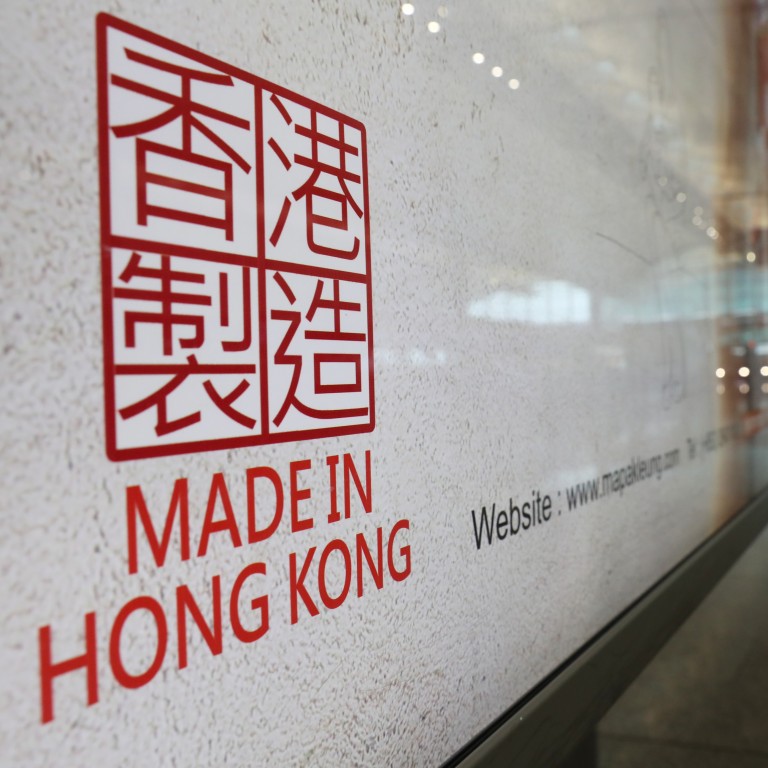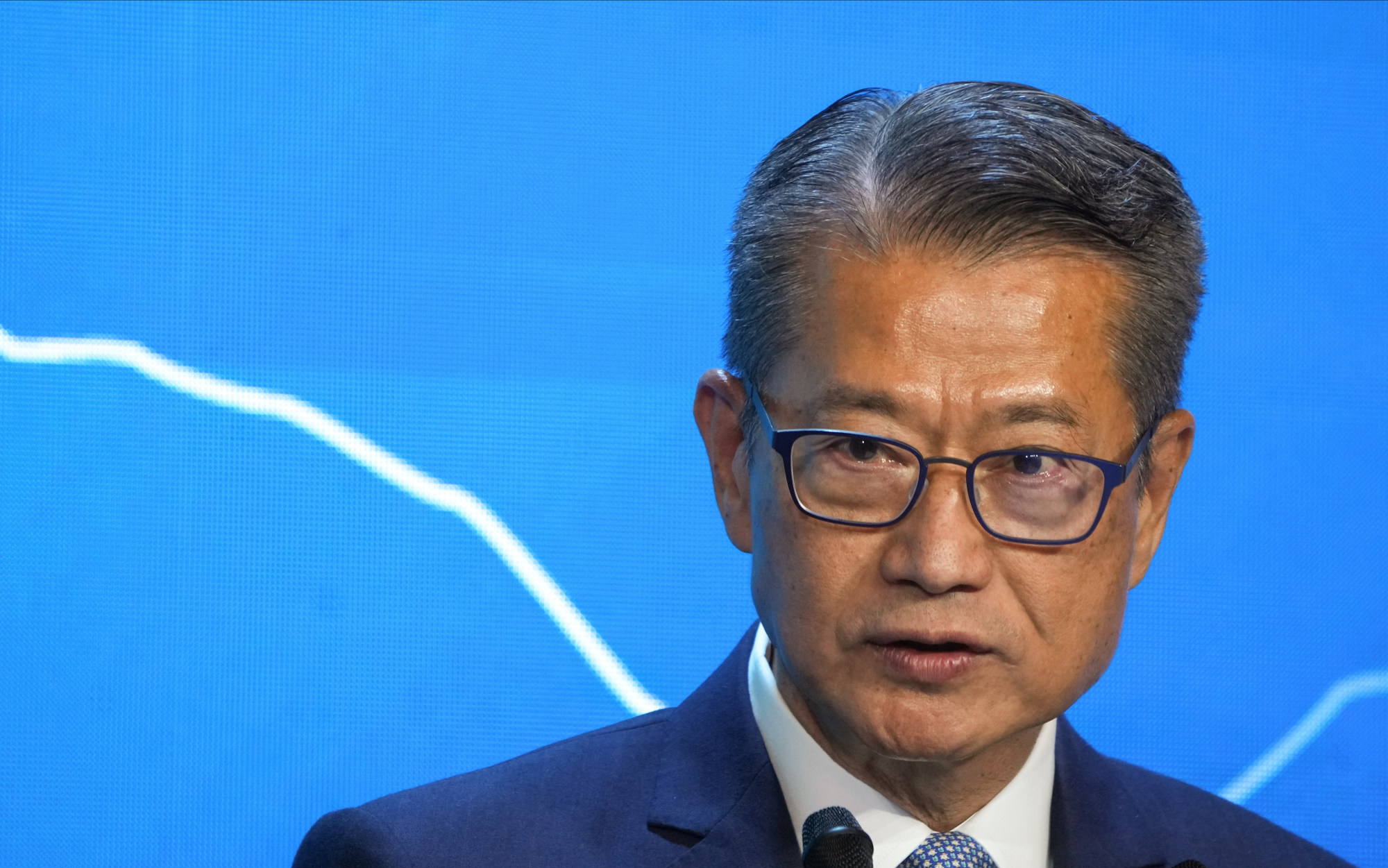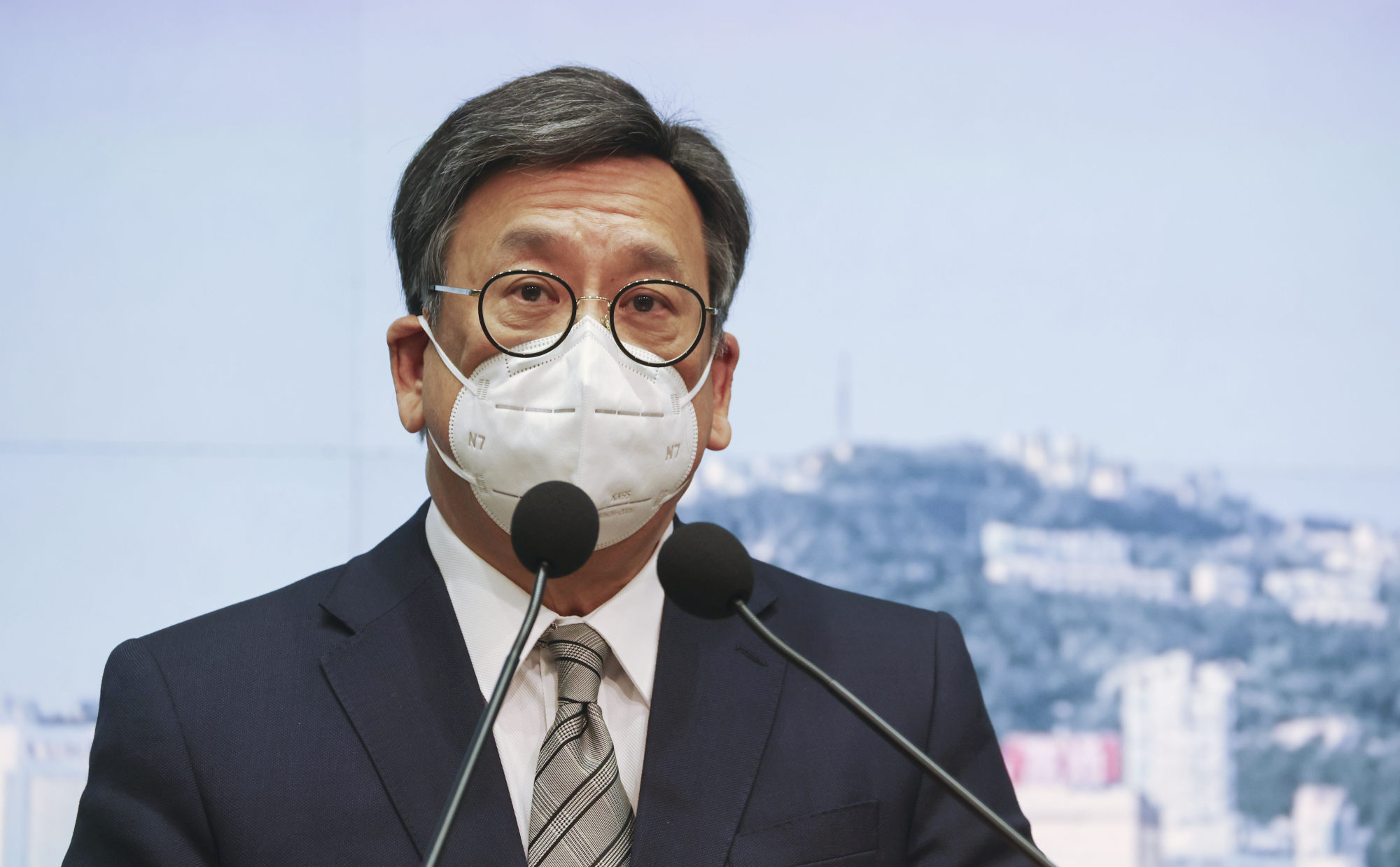
Hong Kong officials, exporters urge US to respect WTO ruling on not needing ‘Made in China’ label for city goods
- Financial Secretary Paul Chan and commerce minister Algernon Yau slam the US ban on the ‘Made in Hong Kong’ label hours after WTO decision
- US trade representative says Washington does not intend to remove the labelling requirement and calls WTO ruling a ‘flawed interpretation’
Hong Kong officials and exporters have joined a chorus of calls urging the United States to abide by a World Trade Organization ruling that it stop requiring local goods to be labelled “Made in China”, saying the city’s long-term brand development was at stake.
Rejecting the ruling by a WTO panel that the United States had broken global trading rules with its labelling move, the US trade representative said Washington did not intend to remove the requirement and called the body’s decision a “flawed interpretation”.
Speaking hours after the ruling, Financial Secretary Paul Chan Mo-po and commerce minister Algernon Yau Ying-wah on Thursday separately slammed the US ban on the “Made in Hong Kong” label and said the city’s objection was necessary as it was a matter of principle.
The ban had a minimal financial impact on the city, they noted.

The city’s economy had long relied on the service industry and re-exports to mainland China, said Chan, who was speaking at the Hong Kong Brands and Products Expo at Victoria Park, where he took the consul generals of Vietnam, Indonesia, Malaysia, Thailand and the Philippines for a visit.
Hong Kong’s domestic exports to the United States, equivalent to HK$7.4 billion (US$949.4 million), accounted for only 0.1 per cent of the total figure last year, while re-exports took up HK$302.3 billion.

Yau said local authorities had written to the US and before taking further action would closely monitor whether Washington would seek an appeal within six months.
“The spirit is to uphold the status and position of the Hong Kong SAR in the WTO as a separate customs territory, even though the financial implication is minimal,” Yau said.
In response to Beijing imposing the national security law on Hong Kong, the US in August 2020 said goods from the city, which is a WTO member, would have to be relabelled to gain entry to its ports – a move intended to underscore the financial hub’s status as “just another Chinese city” in Washington’s eyes.
‘Made-in-Hong Kong’ labels changed to meet Trump’s deadline
Yau said labelling city goods as being from China would “cause a lot of confusion” for customers, and that the existing ban posed “unnecessary restrictions” on local manufacturers at clearance and declaration points when they exported products to the US.
He said the government welcomed the WTO’s panel report that refuted Washington’s “erroneous and groundless views”, demanding the labelling rule be withdrawn as soon as possible.
The Hong Kong Economic and Trade Office in Washington has been tasked to pursue the matter with the Office of the United States Trade Representative, as well as the US Customs and Border Protection.

Both China’s commerce ministry and the foreign ministry’s office in Hong Kong also weighed in, saying they welcomed the ruling and supported the city in maintaining its status as a separate customs territory.
“[The US relabelling] is just an attempt to slander the ‘one country, two systems’ principle, which is also typical power politics and hegemonic logic,” a foreign ministry spokesman said in a statement, adding the Hong Kong government’s complaints were aimed at upholding the basic principles of international law and the multilateral trading system.
It was also a necessary move to urge the US to abide by its international obligations, the statement added.
The commerce ministry said in a brief statement that it hoped the US respected the ruling and took action to correct the mistakes.
Their remarks came just hours after the WTO’s ruling on Wednesday.
A panel of WTO judges found that requiring goods from Hong Kong be labelled “Made in China” violated US commitments to the global trade organisation. Under Article IX: 1 of the General Agreement on Goods and Tariffs (GATT), members must ensure that marking requirements do not disadvantage firms from other WTO members.
While there was evidence of the US “and other members being highly concerned about the human rights situation in Hong Kong”, the panel said, the situation had not yet “escalated to a threshold of requisite gravity to constitute an emergency in international relations” that would permit such behaviour.
The US can appeal the case, but since it has blocked any new appointments to the WTO’s appellate body due to complaints over judicial activism and sovereignty concerns, there are currently no judges to hear appeals. The crisis has cast a shadow over the WTO’s role in enforcing multilateral trade rules.
Before the dispute settlement system ground to a halt, an appellant had 60 days to challenge a WTO ruling and attend an oral hearing to present arguments before an appellate body.
Hong Kong firms prepare as ‘Made-in-China’ label deadline looms
Many Hong Kong exporters and manufacturers also urged the US to reinstate the “Made in Hong Kong” label for the sake of the city’s home-grown brand development despite the mild impact of the labelling change.
Dennis Ng Kwok-on, vice-president of the Chinese Manufacturers’ Association of Hong Kong, said most of the city’s exports to the US were not made in Hong Kong except for jewellery, accessories and some food products such as Lee Kum Kee sauces.
“The impact of the labelling change has been minor, but Hong Kong brands have been a guarantee of high quality to overseas clients. The removal of the ‘Made in Hong Kong’ label will wipe out the city’s industrialisation development and efforts,” he said.
Ng said many foreign customers preferred “Made in Hong Kong” goods over those “Made in China” because the city had greater copyright protection and a good legal mechanism to resolve disputes.
Dennis Ng Wang-pun, founder of Polaris Jewellery Manufacturer and chairman of the Hong Kong Export Credit Insurance Corporation, agreed, saying “Made in Hong Kong” goods could sell for up to 20 per cent more than “Made in China” products because of the quality assurance offered by the city’s brands.
Hong Kong formally demands US drop ‘Made-in-China’ labelling requirement
Danny Lau Tat-pong, honorary chairman of the Hong Kong Small and Medium Enterprises Association, said the city’s exporters and manufacturers had got used to the label change as it had been in place for two years.
“Of course they will be happy to restore the ‘Made in Hong Kong’ label if the US removes the marking requirement. They all feel proud of the ‘Made in Hong Kong’ brand name,” he said.
The Federation of Hong Kong Industries said the ruling reaffirmed Hong Kong as a separate customs territory, demonstrating “righteousness and justice and protecting the interests of consumers”.
It added: “The US should not suppress Hong Kong products exported to the US … ‘Made in Hong Kong’ is an important brand for Hong Kong, which represents high-quality products that offer customers confidence.”
Scott Kennedy, a senior adviser on China at the Centre for Strategic and International Studies in Washington, said the Biden government’s defence of two Trump-era trade actions “reinforces the impression that the similarities between the two administrations’ trade policies are larger than their differences”.
Kennedy added that the WTO “has never been an effective venue to adjudicate disputes that are essentially political or touch on national security”.
“The US labelling requirement may have contravened WTO principles, but the broader message – that Hong Kong had lost its autonomy – was on the money,” he said.
Additional reporting by Finbarr Bermingham in Brussels



